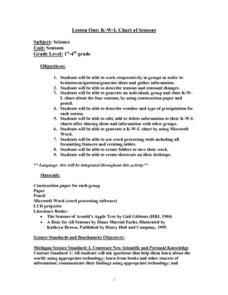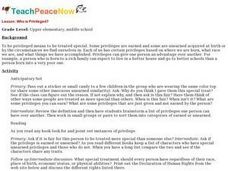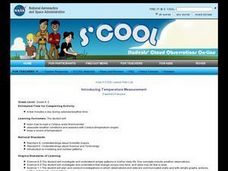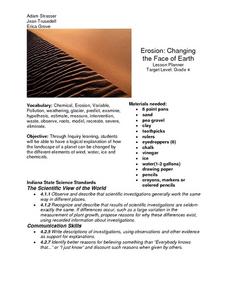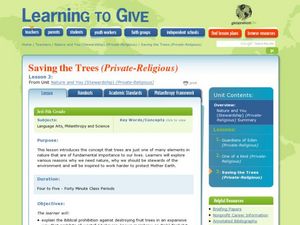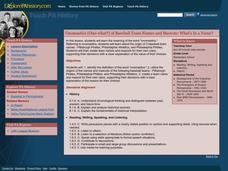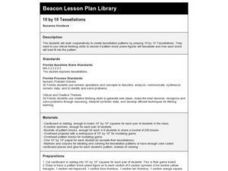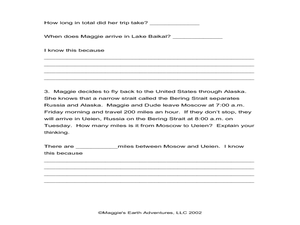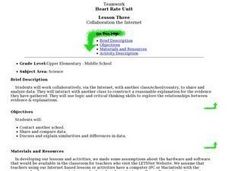Curated OER
K-W-L Chart of Seasons
Young scholars think about what kinds of clothing they are currently wearing and then think about why they are wearing these particular articles of clothing. They write what they already know about seasons and generate questions about...
Curated OER
Descriptive Writing
Fifth graders develop compositions on self-selected topics. They choose a topic based upon their ability. Individual pupils earn points for each activity completed. Students use descriptive writing as they support their composition...
Curated OER
How the West was Won? Conflict and Change on the Western Frontier
Seventh graders assess the conflict and change that occurred in the westward expansion following the Civil War. They list specific reasons why different groups moved west and the interaction between the "white" European civilization and...
Curated OER
Vietnam and the Long-term Effect of War
Young scholars examine the effects of war on civilians. For this Vietnam War lesson, students research and discuss the reasons the Vietnam War began, why America became involved, and what some of the long-term effects of this war were.
Curated OER
Who is Privileged?
Pupils discuss privileges. In this privilege lesson, students discuss the reasons that some people have privileges others don't and whether this is fair. They listen to a story and point out instances of privileges.
Curated OER
Journal Writing Ideas
Students choose a topic from a list to write a journal entry about. In this journal writing lesson, students use one of the ideas included in the comprehensive list of ideas when they cannot think of a topic to write about. They write...
Curated OER
Is this the right book for me?
Sixth graders recognize strategies for selecting nonfiction texts. For this book selection lesson, 6th graders practice procedures for knowing if the book is just right for them. Students select from a variety of texts and share their...
Curated OER
Visualizing Density: Density is Non-obvious
Students explore models of density; wooden balls and marbles discussing whether they think the volume and mass are the same or different. They then compare the density of a loaf of bread that is squished and one that is not compressed.
Curated OER
Conversation - Which school do we choose?
Students engage in a discussion about the reasons for learning English in order to develop their English fluency. They engage in a simulation which is imbedded in this lesson plan.
Curated OER
Logic
Students solve problems using reasoning techniques, identify the validity or non-validity of problems and use deductive reasoning for problem resolution.
Curated OER
Introducing Temperature Measurement
Students explore temperature and use Celcius thermometers to measure and graph the temperature in the classroom daily. They estimate what they think the temperature might be and then find the actual temperature in the room.
Curated OER
Erosion: Changing the Face of Earth
Fourth graders explore how the landscape of the planet can be changed by different elements of wind, water, ice and chemicals through hands-on activities. They examine pictures of areas around town and discuss anything they think is out...
Curated OER
Do Your Best At School
In this poster worksheet, students read strategies and encouragement for doing their best work in school. They read reasons for doing their best, listening well, trying new things, and trying hard.
Curated OER
Saving the Trees
Students identify why trees are important. In this environmental lesson plan, students read the book The Giving Tree and list reasons why humans need trees. Students create a storybook to explain why other natural resources are...
Curated OER
What's In a Name?
Students explore onomastics. In this baseball history lesson, students create their own team name and explain the name they chose. After choosing a team name students support their choice with revelant reasons and be able to discuss...
Curated OER
Hidden Persuaders
Students examine classic propaganda techniques to analyze factors which influence learning and thinking processes influencing formation of public opinion through these lessons.
Curated OER
What sound does a duck make in the rice field?
Students discuss the sounds ducks make. In this duck instructional activity, students find the different reasons why ducks quack : when they are happy, to warn others of danger, for food, and when they see an enemy. They answer questions...
Curated OER
10 by 10 Tessellations
Fifth graders, with a partner, create tessellation patterns by playing 10 by 10 Tessellations. They need to use critical thinking skills to decide if pattern block plane figures tessellate and how each block best fits into the pattern.
Curated OER
Bottled Model Lungs
Students will learn about the respiratory system by comparing and contrasting models, building their own models, and giving one another feedback. Questions about familiar body systems can be useful in getting students to start thinking...
Curated OER
From a Distance
Students think about their neighborhood and get a mental picture of their community. They then interpret aerial photography, learning how to use shapes and patterns to describe urban, suburban and rural communities.
Curated OER
How Many Pancake Tortoises
In this mathematics lesson, 3rd graders estimate how many pancake tortoises they think it will take to reach the height of a giraffe. Students watch a video and take notes before they begin the estimation process
Curated OER
Where in Russia?
In this problem solving worksheet, 5th graders read a short passage and use the given information. Students solve for three problems showing all work and explaining the reasoning for how the problem was solved.
Curated OER
Ancient Sun Models of the World
Students explain that many different cultures across the world developed their own reasoning for the weather around them. They explore the different cultural beliefs of the sun's cycle and to create their own story of the sun's movement.
Curated OER
Collaboration the Internet
Students work collaboratively, via the Internet, with another class/school/country, to share and analyze data. They nteract with another class to construct a reasonable explanation for the evidence they have gathered.


